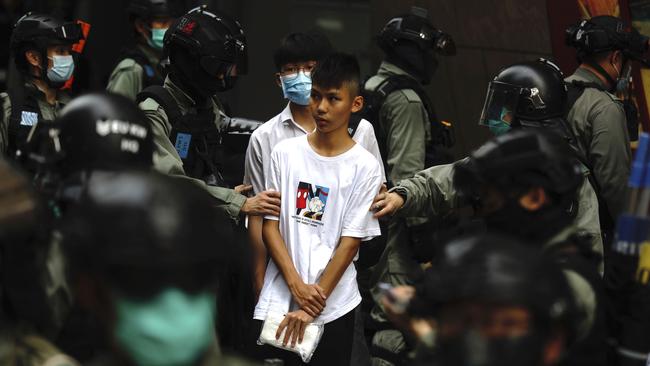Hong Kong no longer autonomous from China declares Mike Pompeo
Stage set for US to withdraw former British colony’s preferential trade and financial status.

US Secretary of State Mike Pompeo has notified Congress that the Trump administration no longer regards Hong Kong as autonomous from mainland China, setting the stage for America. to withdraw the former British colony’s preferential trade and financial status it has enjoyed since it reverted to Chinese rule 23 years ago.
The move does not carry any immediate penalties, which would have to be decided by President Donald Trump in consultation with Congress.
But the administration sees it as putting China on notice that Hong Kong’s perks are in jeopardy.
“Hong Kong does not continue to warrant treatment under United States laws in the same manner as US laws were applied to Hong Kong before July 1997,” Mr Pompeo said in a statement Wednesday.
The notice brings the future of Hong Kong squarely into the administration’s numerous battles with China that have put the world’s two largest economies at odds.
It comes as Hong Kong citizens came under pressure by groups linked to the Chinese Communist Party to sign a petition supporting a Beijing-run security regime, as thousands of riot police were deployed across the city to disperse protesters.
A huge police presence used pepper-ball rounds to quickly disperse hundreds of protesters on Wednesday, as Hong Kong’s politicians met for the second reading of a bill that would criminalise “insulting” China’s national anthem.
Many shops, banks and offices closed early. Police were seen rounding up dozens of people, making them sit on a footpath and then searching them.
The renewed demonstrations came as the Nikkei Asian Review reported that Hong Kong staff at Chinese banks and brokerages felt compelled to sign a petition supporting the new security regime that will be formalised in Beijing at the National People’s Congress on Thursday.
“My boss asked everyone in the team to sign this paper,” said one analyst at a Chinese investment bank, who gave her name as Mandy.
“What can you do? I need this job and there will likely be repercussions if you don’t follow,” said the analyst, according to Nikkei.
China’s central government has launched a widespread influence campaign — in state media and in the offices of mainland-backed businesses — ahead of the enforcement of the security legislation, which would allow Beijing’s security state to operate openly in the city.
The law would prohibit acts of secession, subversion, terrorism or conspiring with foreign influences and is a response to Hong Kong’s 2019 protest movement.
The party’s Xinhua news service reported on Tuesday night that a newly established group — whose co-ordinators include Starry Lee Wai King, chairwoman of Hong Kong’s largest Beijing-loyalist party, the Democratic Alliance for the Betterment and Progress of Hong Kong — was running the petition, which it said had more than 1.1 million supporters.
Hong Kong Chief Executive Carrie Lam, who was criticised last year for her support of an extradition law despite huge public opposition, said she was “glad to see that many residents are very supportive of this work, and fully understand Beijing’s plan”.
“We are a very free society. For the time being, people have this freedom to say whatever they want to say,” she said.
Comments in China’s state media by the city’s delegates currently in Beijing for its major annual political meeting increased some Hongkongers’ anxiety about the legislation.
Major-General Chen Daoxiang, commander of the Hong Kong Garrison of the People’s Liberation Army, told China National Radio it would “help to curb and punish any attempt to jeopardise the national unity”.
Kennedy Wong, another Hongkonger at the political gathering in Beijing, told the Global Times the new national security law would allow China’s ministry of state security to operate freely in Hong Kong.
Mr Wong said the legislation would allow the ministry of state security — Beijing’s infamous secret police — to set up its own branch in the city, with “certain power to enforce law”.
Some of Hong Kong’s delegates currently in Beijing have expressed concern about the law.
Pro-business politician Michael Tien Puk-sun, who opposes the new regime, was reportedly concerned about how it would be applied to people taking part in protests that suddenly turned violent.
Another delegate attending a meeting in Beijing’s Great Hall of the People discussing the legislation was concerned about whether the law would apply to Hongkongers who joined the city’s annual June 4 candlelit vigil to mark the 1989 Tiananmen Square crackdown.




To join the conversation, please log in. Don't have an account? Register
Join the conversation, you are commenting as Logout